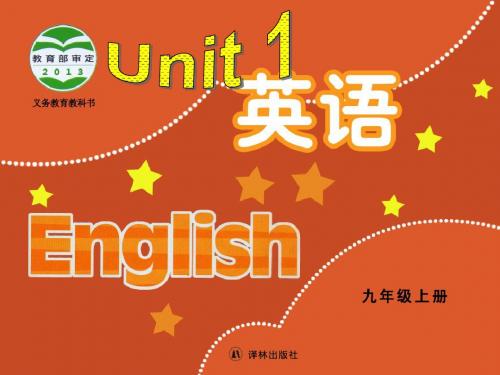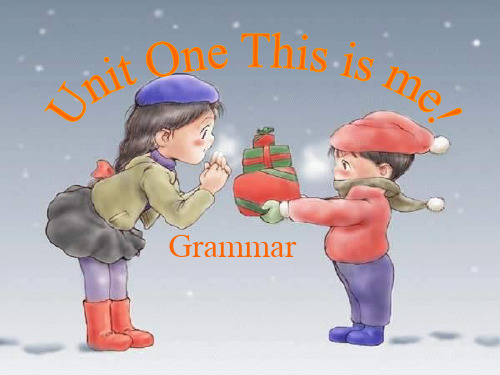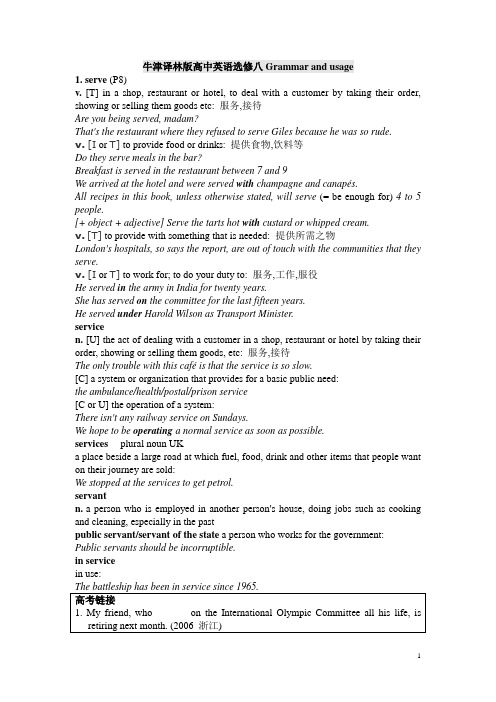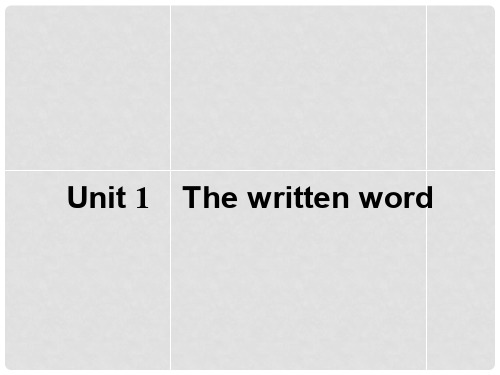英语:unit1《the-written-word》grammar课件(译林牛津版选修8)
牛津译林七年级英语上册Unit1-Grammar-课件(共28张PPT)

2. They are classmates. _A__re_ they classmates? No, they a_r_e_n_’_t.
3. Eddie is Hobo’s master. __I_s__ Eddie Hobo’s master? No, it _is_n_’_t.
Activity 8: Make a conclusion
句型转换
1. His cousin is good at swimming.(改为否定句)
_H__i_s_c_o_u_s_i_n__is_n__’t__g_o_o_d__a_t_s_w__im__m__i_n_g_._
2. Those boys are from Beijing.(改为一般疑问句, 并做否定回答) —A—re—th—os—e b—oy—s f—ro—m—Be—ij—ing—? —No—, t—he—y a—re—n’—t.
Are they classmates?
肯定:Yes, they are. 否定:No, they aren’t.
在一般疑问句的肯定回 答中不能用缩写形式
变疑问,be提前,句末问号莫丢弃。
Fill in the blanks
1. It is a reading room. __Is__ it a reading room? Yes, it __is__.
am
牛津译林英语 九年级上册 Unit1 Grammar (共39张PPT)

1. I dislike not only coffee but also Cola.
2. I like neither maths nor English. 3. You either take the lead or fall
behind. 4. Both Sandy and Millie have been to
neither…nor… “既不……也不……”, 具有否定含义。当neither…or…连接两 个主语时,其谓语动词应与最近的一个 主语在人称和数上保持一致。
e.g. Billy has not finished his homework. Daniel has not finished his homework. Neither Billy nor Daniel has finished his homework.
Amy’s family and classmates Amy is writing about what her family does at the weekend. Help her complete the sentences with the correct conjunctions.
1. __N_e_i_th__e_r_ my dad __n_o_r__ my mum
We use conjunctions like and, but, or and so to join ideas together.
牛津译林七年级英语上册Unit1 Grammar(be动词)课件(共20张PPT)

My hair is long.
things that we do regularly
We often do school activities after class. Kitty goes to a dance class twice a week .
Simon plays football What do you often do after after school.
We use the simple present tense when we talk about things that are true now, things that we do regularly and things that are always true.
things that we do regularly
school?
The moon goes around the earth .
There are seven days in a week .
Can you tell us things that are always true?
things that are always true
Cats eat fish.
N_o_,_t_he_y_d_o_n’_t .
5._D_o_e_s_ Simon like walking?
_Y_e_s,_h_e_d_oe_s_.
6._D_o___ Sandy and Daniel like drawing?
_Y_e_s_, t_h_e_y _do_.
Millie: Daniel, do you play volleyball after school? Daniel: No, I _d_o_n_o__t/_d_o_n_’t__p_la_y_ volleyball after school. Millie: Does Simon play football after school? Daniel: Yes, he always _p_l_a_y_s football after school. Millie: Does Amy walk home after school? Daniel; No, she _d_o_e_s_n_o__t/_d_o_e_s_n_’t_w__a_lk_ home after school. Millie: Does she take the bus? Daniel: Yes, she _t_a_k_e_s_ the bus every day. Millie: Do you like watching TV? Daniel: No, I _d_o__n_o_t_/d_o_n_’_t_li_k_e_ watching TV.
高中英语 Unit 1 The written word课件 译林牛津版选修8

on the run ___________________
live up to
___________________
第七页,共72页。
7. 破烂不堪(pò làn bù kān)的,废旧的;筋疲力尽的
8. 把……分成…… 9. 把……集中在…… 10. 看到,一看到……就 11. 放大;泄露;发出 12. 捡起;获得;学会
3. __g_en_e_r_o_u_s _(adj. )
慷慨的,大方的;宽厚的,仁慈 的
4. __v_a_i_n____(adj. )
荣的,自负的;徒劳的,无结果 的
第二页,共72页。
5.__b_en__t __(adj. ) (n. )
6. _r_e_fo_r_m__ (vt. &vi. &n. )
第三页,共72页。
11. ___a_d_o_r_e_(vt. )
热爱,喜爱,爱慕
12. __s_p_r_i_n_g_(vi. )
突然出现;跳,蹦
13. ______________(n. ) 特征,特点 (adj. )典型的,独特的,特有的→
______c_h_a_r_a(cnt.e)r人is物tic,角色
他忍不co住u炫ldn耀’t起了re他sis的t 新s车ho。wing off
第十八页,共72页。
【助记】后接动名词作宾语的动词可用下列口诀记忆 考 虑 建 议 盼 原 谅 (consider, suggest/advise, look forward to, excuse/pardon) 承认推迟没得想(admit, delay/put off, fancy) 避免(bìmiǎn)错过继续练(avoid, miss, keep/keep on, practise) 否认完成爱欣赏(deny, finish, enjoy/appreciate) 不禁介意准逃亡(can’t help, mind, allow/permit, escape) 不准冒险凭想像(forbid, risk, imagine)
牛津译林版高中英语选修八《Unit 1 The written word》 Grammar 教案 3

牛津译林版高中英语选修八Grammar and usage1. serve (P8)v. [T] in a shop, restaurant or hotel, to deal with a customer by taking their order, showing or selling them goods etc: 服务,接待Are you being served, madam?That's the restaurant where they refused to serve Giles because he was so rude.v.[I or T] to provide food or drinks: 提供食物,饮料等Do they serve meals in the bar?Breakfast is served in the restaurant between 7 and 9We arrived at the hotel and were served with champagne and canapés.All recipes in this book, unless otherwise stated, will serve (= be enough for) 4 to 5 people.[+ object + adjective] Serve the tarts hot with custard or whipped cream.v.[T] to provide with something that is needed: 提供所需之物London's hospitals, so says the report, are out of touch with the communities that they serve.v.[I or T] to work for; to do your duty to: 服务,工作,服役He served in the army in India for twenty years.She has served on the committee for the last fifteen years.He served under Harold Wilson as Transport Minister.servicen. [U] the act of dealing with a customer in a shop, restaurant or hotel by taking their order, showing or selling them goods, etc: 服务,接待The only trouble with this café is that the service is so slow.[C] a system or organization that provides for a basic public need:the ambulance/health/postal/prison service[C or U] the operation of a system:There isn't any railway service on Sundays.We hope to be operating a normal service as soon as possible.services plural noun UKa place beside a large road at which fuel, food, drink and other items that people want on their journey are sold:We stopped at the services to get petrol.servantn.a person who is employed in another person's house, doing jobs such as cooking and cleaning, especially in the pastpublic servant/servant of the state a person who works for the government:Public servants should be incorruptible.in servicein use:v. [T]1)to take care of a person, or an animal or plant, until they are completely grown: 抚养Her parents died when she was a baby and she was raised by her grandparents.The lambs had to be raised by hand (= fed artificial milk by people)when their mother died.The farmer raises (= breeds) chickens and pigs.The soil around here isn't good enough for raising (= growing) crops.2) to cause sth. to increase or become bigger, better, higher, etc: 抬高, 提高The government plan to raise taxes.I had to raise my voice (= speak more loudly) to make myself heard over the noise. The inspector said that standards at the school had to be raised.Our little chat has raised my spirits (= made me feel happier).3) to lift sth. to a higher position: 举起Would all those in favor please raise their hands?He raised the window and leaned out.Mary Quant was the first fashion designer to raise hemlines.3. abuse (9)v. [T] 1) to use or treat someone or sth. wrongly or badly, especially in a way that is to your own advantage: 虐待She is continually abusing her position/authority by getting other people to do things for her.I never expected that he would abuse the trust I placed in him.Several of the children had been sexually/physically/emotionally abused.2) to speak to someone rudely or cruelly: 辱骂The crowd started abusing him after he failed to save a goal.n. [U] rude and offensive words said to another person: 辱骂He had apparently experienced a lot of verbal abuse from his co-workers.He hurled (a stream/torrent of) abuse at her (= He said a lot of rude and offensive things to her).'Idiot!' is a mild term of abuse (= an insulting expression).child abusen. [U] when adults intentionally treat children in a cruel or violent way: 虐待儿童4. get caught (P9)v. [L + past participle] (getting, got, got or US gotten) sometimes used instead of 'be' to form the passive:I got shout ed at by some idiot for walking past his house.They're getting marri ed later this year.pressv. [I or T; usually + adv. or prep.] to push sth. firmly, often without causing it to move permanently further away from you: 按,压Press the button to start the machine.He pressed his face against the window.Can you press a bit harder on my shoulders, please?The crowd pressed against the locked doors trying to get into the building.Press down firmly on the lever.[T] to make clothes smooth by ironing them: 熨烫I'll just press these trousers.[T] to put a weight on fruit in order to remove the juice: 榨汁to press grapes[T] to make a record or CD: 制唱片Over 3000 copies of the CD were pressed and sent some out to college radio stations. [T] to make sth. flat and firm by putting it under sth. heavy: 压扁The children pressed some flowers.pressed turkey breastn. [C usually singular] a firm push against sth. using the fingers: 按,压To start the machine, just give this button a press.[S] when you make cloth smooth with an iron: 熨烫Can you give this shirt a quick press?[C] a piece of equipment which is used to put weight on something in order to crush it, remove liquid from it or to make it flat: 熨斗a garlic/trouser/wine pressto try hard to persuade someone to do something: 强迫,迫使[+ object + to infinitive] The committee pressed him to reveal more information.He's pressing me for an answer.Can I press you further on(= persuade you to say more about) this issue?pressuren. [U] the force you produce when you press sth.: 压力He put too much pressure on the door handle and it snapped.You can stop bleeding by applying pressure close to the injured area.[C or U] the force that a liquid or gas produces when it presses against an area:gas/water pressureThe new material allows the company to make gas pipes which withstand higher pressures.The gas is stored under pressure (= in a container which keeps it at a higher pressure than it would usually have).[U] when someone tries to make someone else do sth. by arguing, persuading, etc: 压力(抽象)public/political pressureTeachers are under increasing pressure to work longer hours.[+ to infinitive] Pressure to abandon the new motorway is increasing.The government is facing pressure from environmental campaigners.He only asked her under pressure from his wife (= because his wife forced him to). She's putting pressure on him (= trying to persuade him) to get married.FORMAL The international community are trying to bring pressure to bear on the government (= trying to persuade them) to resolve the situation.[C or U] a difficult situation that makes you feel worried or unhappy:She's got a lot of pressure on her at work just now.Be nice to him - he's been under a lot of pressure recently.Can you work well under pressure?n.[C] a suggestion that sth. unpleasant or violent will happen, especially if a particular action or order is not followed: 威胁[+ to infinitive] She carried out her threat to throw away any clothes that were left on the floor.The threat of jail failed to deter him from petty crime.Drunken drivers pose a serious threat (= cause a lot of harm) to other road users.He says he'll tell the authorities but it's just an empty threat (= it will not happen).be under threat of sth.to be in a situation where people are threatening you with sth. bad or unpleasant: 在……的威胁之下She left the country under threat of arrest if she returned.threatenv. [T] to tell someone that you will kill or hurt them, or cause problems for them if they do not do what you want: 威胁They threatened the shopkeeper with a gun.[+ to infinitive] They threatened to kill him unless he did as they asked.[I] If sth. bad threatens to happen, it is likely to happen: 预兆,征兆Look at those clouds! There's a storm threatening.[T] to be likely to cause harm or damage to sth. or someone: 对……造成威胁v. [I or T] to fight against sth. or someone that is attacking you: 抗拒……的诱惑The soldiers resisted (the enemy attacks) for two days.[T] to refuse to accept or be changed by sth.: 拒绝The party leader resisted demands for his resignation.He tried to run away from the police and was charged with resisting arrest.The new hybrid crops are much better at resisting disease.[T] to stop yourself from doing sth. that you want to do: 克制自己去做某事I can never resist temptation/chocolate/the urge to laugh.[+ ing form of verb] She couldn't resist laughing at him in those clothes.resistancen. [U] when sth. or someone resists:resistance to diseaseGovernment troops offered no resistance (to the rebels).There's a lot of resistance (= opposition) to the idea of a united Europe.[U] a force which acts to stop the progress of sth. or make it slower:The car's speed was reduced by air/wind resistance.[C or U] SPECIALIZED the degree to which a substance prevents the flow of an electric current through it:Copper has (a) low resistance.resistantadj. 1) not wanting to accept sth., especially changes or new ideas:Why are you so resistant to change?2) not harmed or affected by sth.:a stain-resistant carpeta disease-resistant variety of tomato。
Module 8《Unit1 The written world》(Grammar)(牛津译林版)

Grammar
序言
本编为大家提供各种类型的PPT课件,如数学课件、语文课件、英语 课件、地理课件、历史课件、政治课件、化学课件、物理课件等等,想了 解不同课件格式和写法,敬请下载!
Moreover, our store provides various types of classic sample essays, such as contract agreements, documentary evidence, planning plans, summary reports, party and youth organization materials, reading notes, post reading reflections, essay encyclopedias, lesson plan materials, other sample essays, etc. If you want to learn about different formats and writing methods of sample essays, please stay tuned!
Negative statements are often used to correct a mistaken idea.
Step 4 Group Discussion
conclude the form (s) of negative statement
For example
examples structures types conclusions
uncommon to find 有否定前缀的单词前面:
her reading the
高中英语Unit_1《The_written_word》课件_Word_power(牛津译林版选修8)

6.A book about the life of someone is called a biograp.hy
7.Ashort work of fiction with only a few characters and a simple plot is called a short story . 8.I like non-fiction literature, especially news articles in newspapers.
Discuss those questions in small groups, then write down all the categories said by students on the blackboard.
Read the article about different categories of literature in part A.
Match the writers with suitable works according to part B
Katherine Mansfield William Shakespeare
John Keats Charles Dickens
Great Expectations Miss Brill Ode to Nightingale Romeo and Juliet
novel romance
• a complex plot • popular
News article Non-fiction biography
高中英语 Unit1 The written word课件 牛津译林版选修8

Ⅰ.词汇拓展
1.
n.特征,特点 adj.典型的,独特的,特有的→
n.性格,品质;
特性 →
vt.描绘……的特征;以……为特征
答案:characteristic;character;characterize
2.
n.小说家 →
n.小说
答案:novelist;novel
3.
vt.& n.虐待;辱骂;滥用→
Charles Dickens,the greatest representative(代表) of English critical realism(批判现实主义),was born in 1812 at Portsmouth.When he was four years old,his family moved to Chatham,and the five years he spent there was the happiest of all his boyhood.
In 1821 the Dickens family moved to a poor quarter in London.Mr Dickens was heavily in debt.Finally he was taken to the Marshalsea Prison(英国法庭监狱) for debt.Shortly afterwards Mrs Dickens and the younger children went to the prison,too,to join the father.
诱思探究 1.How many years did Charles Dickens live in Chatham when he was young? 2.Why did Dickens refuse to read to his fellow passengers on a trip to England? 答案:1.Five years. 2.Because he had read too much during his visit in America.
- 1、下载文档前请自行甄别文档内容的完整性,平台不提供额外的编辑、内容补充、找答案等附加服务。
- 2、"仅部分预览"的文档,不可在线预览部分如存在完整性等问题,可反馈申请退款(可完整预览的文档不适用该条件!)。
- 3、如文档侵犯您的权益,请联系客服反馈,我们会尽快为您处理(人工客服工作时间:9:00-18:30)。
10.Unless Oliver can …,he will never be ……(line24- 25)
11.He will have only misfortune, not a real ……(line 26)
Step 6 Finish Part B on page 9
Answers: 1.surprised if, didn’t 2.not uncommon 3.Not many 4.wonder whether/if, shouldn’t
2).全否定词+肯定谓 语部分 3).not+any/anyone/a nybody/anything/ anywhere/either
4.The problems 4). 带否定词缀的词 remained unsettled.
Part 2
examples
1.It is not uncommon to find her reading the newspaper. =It is quite common to find her reading the newspaper. 2.Unless you read the novel yourself, you will never know what happens at the end.
structures types
隐性否定是 一种有意无 形的含蓄否 定,常用含 否定词的单 词,词组,句 型等来表示 否定意义. 这种否定意 义用法隐藏 在句子的深 层含义中.
conclusions
含有否定意义的词汇与结构 1.动词及短语动词: fail (+to do.), miss, ignore prevent/keep/ protect ... from等2.名词:absence, failure, refusal等 3.形容词: few, little, free (from), far from等 4.副词:hardly, seldom等 5.介词: above, beneath, below, out (of) 等 6.连词:unless, before, or 等 7.结构: too…to 太…(以致于)不 rather…than “宁愿…而不 ”等
Part 5
examples
1.Pip can hardly wait to begin his new life. 2.The classis are far from disappearing. 3.Pip’s sister seldom has a kind word to say 4..Unless you read the novel yourself, you will never know what happens at the end. 5.The fortune sets him free from financial worries. 6.Joe would rather die than see any harm come to pip.
structures
1.not+many/much/very much/some/a phrase of time, distance or a noun phrase including quantities.
types conclusions
含有总括含义 的词,用于否定 句时,只否定一 部分,而不是 完全否定.如all,
everybody everything, always, both/every 3.I can’t see everybody. body/everything 4.I don’t wholly agree 3.以一般否定句的形式 出现,即把否定主语的 with you. not与谓语动词放在一 起。
隐 性 否 定
Step 5 Do Part A on page 9
Answers: 1. … experiences an abnormal childhood without any parents.(line 4) 2. … with other children who also have no parents. .(line 5) 3. …,where he has to work very hard and hardly has time to relax.. .(line 6) 4.Oliver does not like anything about the workhouse. .(line 7) 5.He is treated very badly and seldom has enough food or water. .(line 8)
structures types conclusions
主句+ whether /if引导 的否定 陈述
if从句 中的 附加 否定 将否定词和whether /if连用,来表达对于某 种情况的疑虑, 常用 于口语中. I wonder whether/if … 一般用于表达个人的 决定 I wouldn’t be surprised if… 一般不用于表达个人 的决定
部 分 否 定
wholly 等词与 not连用时,在 汉语中译为 “不全是” “不总是”等.
Part 4
examples
1.I wonder whether/if I shouldn’t bring an umbrella. =I wonder whether/if I should bring an umbrella. 2.I wouldn’t be surprised if they didn’t move soon. =.I wouldn’t be surprised if they moved soon
Homework
Do Part C1 andC2 on page 102 of the workbook
Thank you ! Bye !
;
/ AG亚游集团
orz81msr
遇入宅窃贼抢财伤人的那天,由于那个窃贼出手太狠,他只好就手从烤饼炉的旁边操起一条又粗又长的捅火棍照着其脑袋狠狠地打了下去。尽 管当时天色昏暗没有看清楚那贼的面孔,但个头应该跟眼前的这个人差不太多。根据当时那窃贼的惨叫声,估计他受伤不轻。而眼前的这人有 些贼头贼脑的,而且那道明显的疤痕正好是当时捅火棍落下去的左侧额头上„„这样想着,耿正表情肃穆,目不斜视地稳稳坐在车上从他身旁 经过。一会儿,后边传来一声呼哨声。耿正略略回头望去,发现那个人的身边又多了两个人,并且三个人还在那里指指点点地说着什么。耿正 没有吭声,继续以不变的速度赶车前行。又走了一会儿,后面好像再看不见什么人了。耿正略微放心一些,扬鞭驱赶大白骡加快赶路。为了不 让弟弟妹妹担心,耿正只是故作轻松地说:“咱这头大白骡好脚力啊!就这样的速度,用不了两天时间,咱们就可以到达‘望山寨’大路边上 大哥大嫂开的那个小饭店了。”48第九十四回 老乡四人话别情|(老乡四人话别情,承诺代为上祖坟;购置装扮“送灵车”,次日一早即起 程。)那日晚上,耿正兄妹三人特意来到李老乡的家中,与这位同甘共苦近四年的叔叔以及婶子和两个孩子辞别。李老乡夫妇盛情邀请耿正兄 妹三人明日中午来家中吃辞行饭。耿正兄妹三人想到李叔叔一家人这些天肯定很辛苦很繁忙,就婉言谢绝了夫妇二人的好意。耿正说:“铺子 里离不开人,我们临行之前事情也很多。咱们不是外人,吃个啥饭啊!我们今儿个过来,一是辞行,二是想问问叔叔,可有需要给老家人捎带 的家书或者东西什么的,以及需要我们帮助办理的其他一些事情!”李老乡轻轻地叹一口气,说:“唉,我在老家已经没有什么至亲了。只是 那一年送回爹娘的灵柩之后,一直就再没有时间回去给老人家上过坟。如果你们兄妹仨能帮我在爹娘的坟前上柱香,烧上一些纸钱,告诉二老 我和家人在这里一切安好,我就非常感谢了!只是感觉有些太麻烦你们了。唉,实际上啊,仔细想一想也没有这个必要了呢,他们已经忙碌完 了自己的一生,彻底安息了,我又何必给你们兄妹三个增添麻烦呢!”耿正赶快说:“叔您怎么这么说呢?我们去给老人家上坟几乎就是顺路 的事儿,有什么麻烦可言!我们一定替您送上这一份孝心,为二老上香,烧上足够多的纸钱,并转达您说的话!”但李老乡听了,却摆了摆手 连声说:“算啦算啦,不用去了!我也真是有些老了,怎么想起来这一出呢!”耿正兄妹三人见李老乡这样说,都忍不住笑了起来。耿英说: “我说叔哇,您说什么呢!祭祖是人之常情,更何况是自己的亲爹娘了!这和您老不老又有什么关系啊!”耿直则调皮地说:“叔叔,您的爹 娘是我们的爷爷和奶奶呢,我们应该去给两位老人
Unit 1 The written word
Grammar
Unit One The written word
Grammar and usage Negative statements
Step 1 Lead-in
Beijing University is not one of the best universities in China.
structures
1).助动词+not
types 全 体 否 定
conclusions
全体否定是百分之百 地否认一个事物的存 在、成立或真实性。 表示全体否定的否定 词有:no, not, nothing, nobody, none, nowhere, never, neither, nor, not...nearly, not...half, 以及not...possible 等.
2)用否定跟含否定意义的 连接unless, until, but 等词连用,构成双重否定, 用来表示强烈的肯定。
Part 3
examples
1.Not many people heard the speech =Very few people heard the speech. 2.Not all he said was to the point.
